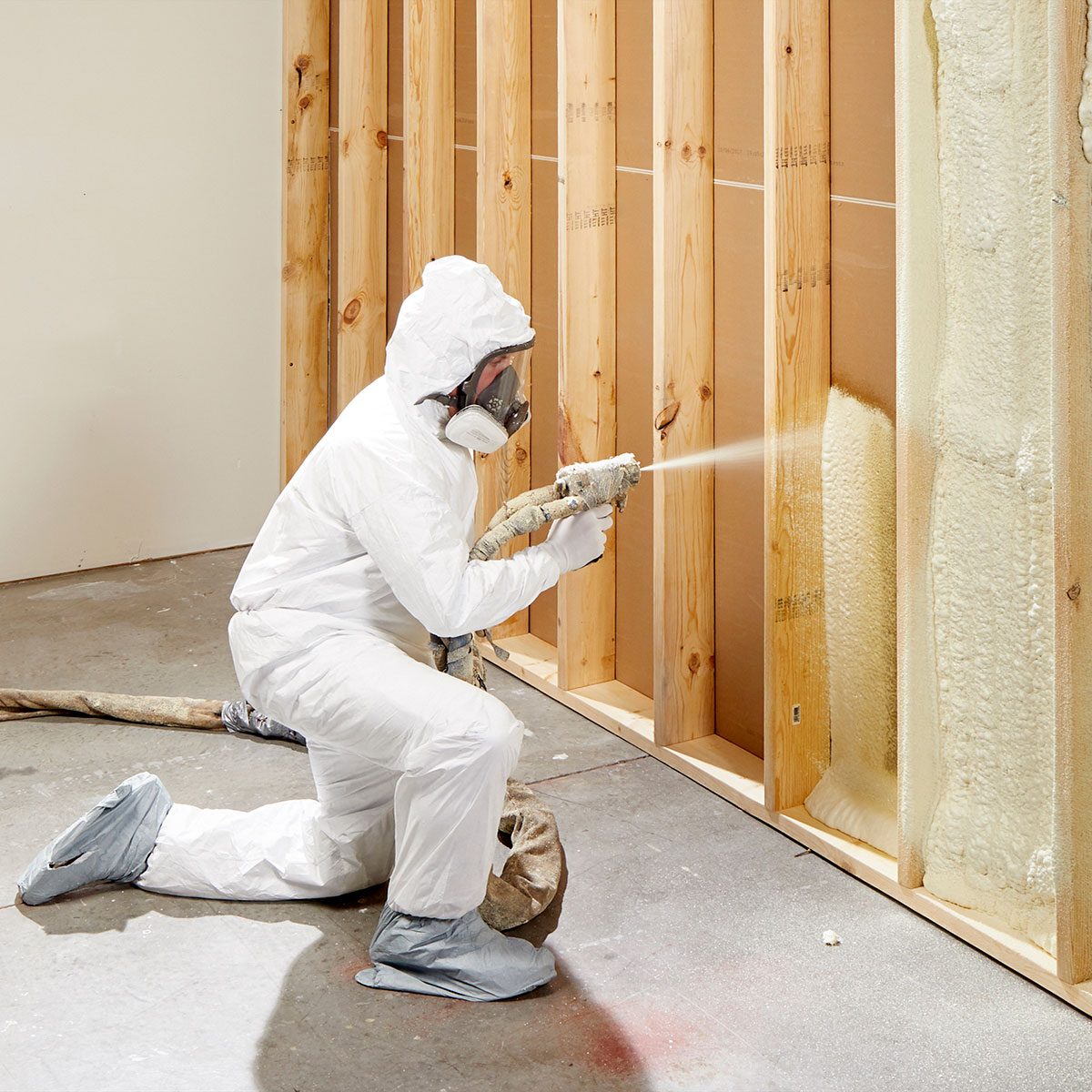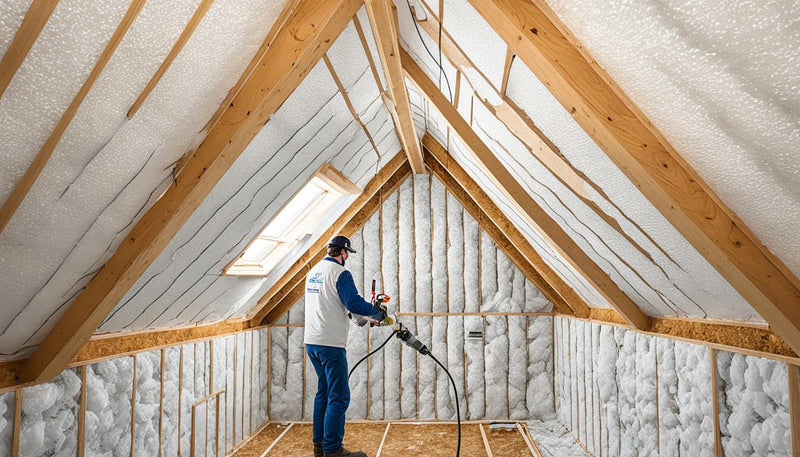Frequently Asked Questions Regarding Spray Foam Installation and Usage
Frequently Asked Questions Regarding Spray Foam Installation and Usage
Blog Article
Spray Foam: The Ultimate Service for Air Sealing and Insulation
Spray foam insulation has emerged as a leading remedy for effective air sealing and thermal insulation, providing a special combination of buildings that set it apart from typical techniques. Recognizing the complete extent of its advantages, installment processes, and contrasts with various other insulation kinds is vital for making informed decisions.
What Is Spray Foam?
Spray foam is a flexible insulation product that integrates the principles of air securing and thermal resistance to enhance power efficiency in structures. Composed primarily of polyurethane or various other comparable compounds, spray foam is used as a liquid that expands upon call with surface areas, creating a solid, constant layer of insulation. This one-of-a-kind home enables it to fill up spaces, cracks, and gaps that standard insulation materials may neglect, supplying a premium air seal.
There are two main sorts of spray foam: open-cell and closed-cell. Open-cell spray foam is lighter and much more flexible, using outstanding noise absorption and a reduced R-value per inch - Spray Foam. On the other hand, closed-cell spray foam is denser, supplying a higher R-value, wetness resistance, and included structural integrity to constructing parts
The application procedure usually includes customized devices, ensuring a smooth application that follows different substratums, consisting of concrete, metal, and timber. This flexibility makes spray foam suitable for both brand-new building and constructions and retrofitting existing structures. Its ability to produce a closed barrier considerably adds to reducing energy consumption and improving indoor air quality, consequently making it a recommended option among property owners and contractors alike.
Benefits of Spray Foam Insulation
One of one of the most significant advantages of spray foam insulation is its extraordinary ability to create a constant air obstacle, which successfully minimizes power loss. Unlike standard insulation materials, spray foam increases to load spaces and fractures, making sure that air leak is drastically minimized. This characteristic not only boosts power efficiency however likewise leads to lower energy bills in time.
Additionally, spray foam insulation supplies remarkable thermal resistance, contributing to a more secure indoor setting. Its high R-value per inch permits efficient insulation in constrained rooms, making it ideal for attics, wall surfaces, and crawl areas. The moisture-resistant residential properties of spray foam help avoid mold and mildew growth, promoting healthier living conditions.
Another essential benefit of spray foam insulation is its sound-dampening qualities (Spray Foam). It effectively reduces noise transmission in between spaces, developing a quieter and more comfy home setting. The longevity of spray foam likewise attracts attention, as it does not droop or work out over time, keeping its performance throughout its life-span
Exactly How Spray Foam Works
Comprehending just how spray foam insulation works is necessary for valuing its performance in air sealing and thermal resistance. Spray foam insulation contains 2 key components: isocyanate and polyol resin. When these components are blended, they undertake a chemical reaction that causes the product look at this site to broaden swiftly, developing a dense foam that fills dental caries, splits, and voids.
As the foam increases, it sticks to surface areas, forming an impermeable seal that significantly minimizes air seepage. This characteristic makes spray foam insulation highly efficient at avoiding drafts and moisture penetration, which can lead to power loss and damage in time. Additionally, the closed-cell version of spray foam offers remarkable thermal resistance as a result of its stiff structure, successfully decreasing warm transfer.
The unique homes of spray foam permit it to adapt to uneven surface areas, making sure extensive insurance coverage and a seamless obstacle. As an outcome, spray foam insulation not just boosts power efficiency however additionally adds to enhanced indoor air quality by minimizing the buildup of toxins and irritants. Eventually, recognizing the auto mechanics behind spray foam highlights its function as a remarkable choice for insulation and air securing in both industrial and property applications.
Setup Refine Summary

Before setup, the area has to be click here now effectively cleaned and prepped, guaranteeing that surfaces are without dust, dampness, and debris. Due to the fact that contaminants can jeopardize bond and total efficiency, this action is important. When the location is prepared, the application involves mixing the two elements of the spray foam, which broadens upon get in touch with and fills up voids successfully.
Trained experts ought to conduct the installment, using specialized equipment to guarantee consistent protection and optimum thickness. Safety safety measures, including using protective equipment and guaranteeing appropriate ventilation, are important during this procedure. After application, the foam usually treatments rapidly, developing a strong obstacle that boosts energy performance.
Comparing Spray Foam to Conventional Insulation
When reviewing insulation alternatives, spray foam insulation stands out in comparison to traditional materials such as fiberglass and cellulose. Unlike fiberglass and cellulose, which can permit air infiltration, spray foam broadens upon application, loading gaps and crevices to produce an airtight seal.
In addition, spray foam offers a greater R-value per inch than traditional insulation kinds, supplying more efficient thermal resistance in a thinner profile. This particular is particularly valuable in areas with minimal tooth cavity deepness. In addition, spray foam is immune to dampness and mold and mildew growth, which can be a substantial worry about cellulose and fiberglass, specifically in damp environments.
Nonetheless, spray foam insulation typically lugs a higher upfront cost than its standard equivalents. House owners should weigh this first investment against lasting power cost savings and performance benefits. Eventually, while both insulation types offer their purpose, spray foam emerges as an advanced remedy for modern-day insulation needs, specifically in terms of air securing and thermal efficiency.

Final Thought
In recap, spray foam insulation represents an extremely reliable solution for achieving ideal air securing and thermal resistance. Its unique properties, consisting of moisture resistance and sound dampening, make it suitable for numerous applications in both brand-new constructions and retrofitting tasks (Spray Foam). The preliminary costs might be greater contrasted to standard insulation products, the lasting advantages, such as substantial energy cost savings and boosted interior air high quality, justify the financial investment and underscore its worth in modern structure techniques.
Spray foam insulation has actually arised as a leading option for reliable air page sealing and thermal insulation, offering an unique combination of residential properties that establish it apart from typical techniques.Spray foam is a versatile insulation product that integrates the concepts of air sealing and thermal resistance to boost energy effectiveness in buildings.When examining insulation options, spray foam insulation stands out in comparison to traditional products such as fiberglass and cellulose. Ultimately, while both insulation kinds serve their purpose, spray foam arises as a much more innovative service for modern insulation demands, particularly in terms of air sealing and thermal efficiency.
In recap, spray foam insulation represents an extremely reliable service for achieving optimum air sealing and thermal resistance.
Report this page